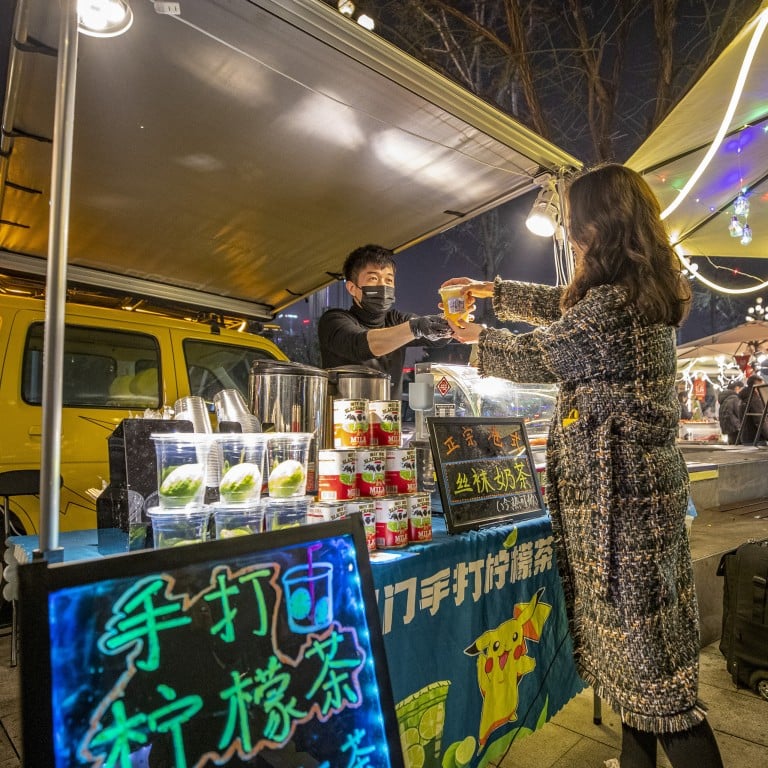
China jobs: street vending returns as popular, and sometimes lucrative, side hustle
- In a difficult economic time when jobs are hard to come by, selling wares and trinkets on the streets has growing appeal
- Shanghai is among cities encouraging people to set up street stalls in designated areas, and vendors are seeing more foot traffic in a post-Covid China
Just two weeks after Linda Xiong started posting online about her street-vending experience, around 900 like-minded netizens joined the group chats she created on Xiaohongshu, China’s Instagram-like platform.
Discussing ideal locations to set up street stalls, and popular goods among passers-by, some hoped to take on a side hustle after work, while others were looking to be full-time street vendors.
“I really don’t want to go back to work in the office,” one said.
“I just lost my job,” another said.
As China’s white-collar staff fear firings, grads face unimaginable challenges
“The government is encouraging people to set up street stalls in designated areas. So, I resumed business,” said the 31-year-old who sells mainly hand-knit toys near shopping malls around Shanghai. “So far, it’s not bad. I can make 20,000 yuan (US$2,900) a month if I work for most of the day.”
The Shanghai municipal government issued a detailed plan late last month to allow individuals to set up open-air stalls in an “orderly” manner, amid efforts by local governments across China to stimulate the ailing economy.
It came just three months after the city – which endured a traumatic two-month lockdown last spring – lifted its ban on roadside stalls in an amendment to regulations on the city’s appearance.
Previously, street stalls were completely prohibited, and street vendors were considered an eyesore due to concerns over sanitation and disorder.
Facing increasing pressure from the job market and chasing a different lifestyle, many of the city’s dwellers, mostly in their twenties and thirties, are turning to the streets to make a living amid loosened government policies.
While the comeback of street stalls is expected to liven up the city’s atmosphere and create jobs, how much it can spur growth and whether it’s sustainable remain questionable, some experts said.
Professor Shi Lei, from Fudan University’s School of Economics, said street vending is “the reuse of space” when the night falls and vehicle traffic fades away.
“It’s a pressing issue – spurring economic recovery and stimulating spending – for every city at the moment. The exit of zero-Covid has provided great room for street stalls,” he said.
“Although street markets are not something a city can rely on for economic growth, they help improve people’s income, which is very important, especially to those who are facing a decrease in their pay. And they impose no burden on the government.”
He added that the so-called night economy, driven particularly by youths, has great potential, and because of increased awareness it is not inducing as many problems as had been seen in the past, including harm done to a city’s image and the accumulation of waste.
Regulators generally lack the knowledge, ability and authority to make use of urban space, and therefore conflicts are likely to arise
Many of China’s tycoons today, such as Jack Ma and Liu Chuanzhi, used to run street stalls in the 1980s and 1990s, but such jobs would go on to become less ubiquitous amid efforts to clean up urban areas.
With advocacy from Premier Li Keqiang, many local governments, including Beijing and Chengdu, embraced a boost from the “street stall economy” in 2020. It gradually disappeared later, however, as the country’s economy rebounded in 2021.
Professor Wang Hui, from the Zhejiang Tongji Vocational College of Science and Technology, said that while the return of street stalls offers support to the economically and socially disadvantaged, it may bring about a series of challenges.
Besides inadequacy of overall planning and market service, “regulators generally lack the knowledge, ability and authority to make use of urban space, and therefore conflicts are likely to arise”, he noted.
There is also a high level of homogeneity in what’s being sold, as well as concerns over high stall fees, he added.
China’s e-commerce sector sees at least 89 platforms go under in 2022
According to the new rule in Shanghai, district governments will designate public areas – such as pedestrianised zones and space outside food markets – for temporary stalls, but restrictions will still remain in key areas such as around major roads, schools and hospitals.
“Most of the designated areas charge several hundred yuan a day, per stall, which is quite a big cost as your revenue may be only a few hundred yuan on a bad day,” said Alice Peng, who runs an online shop of pearl jewellery and has been trying street selling on weekends since early last month.
“But if you go to places free of charge, then there’s not only the possibility of being driven away by the chengguan, but there are not many customers,” said the 28-year-old.
The chengguan are urban management officers in almost every mainland city, and they have long been known for their forceful crackdowns on illegal street vendors.
For Xiong, running a stall is tiring work, but it certainly has its merits.
“I made less than 8,000 yuan a month from my last job, and I had to punch in and punch out every working day,” said Xiong, who was a cashier at a private company.
“Now my income is unstable – on bad days it could be zero, but on good ones it exceeds 1,000 yuan … I have more freedom. I think business will be better as the weather gets warmer.”


